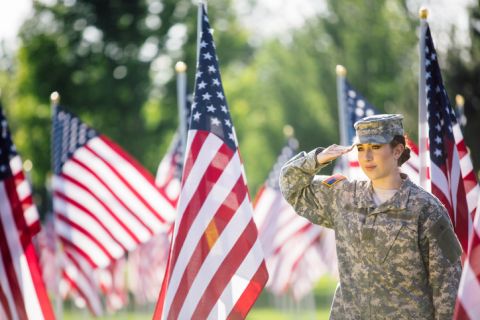Request Information
We're Sorry
There was an unexpected error with the form (your web browser was unable to retrieve some required data from our servers). This kind of error may occur if you have temporarily lost your internet connection. If you're able to verify that your internet connection is stable and the error persists, the Franklin University Help Desk is available to assist you at helpdesk@franklin.edu, 614.947.6682 (local), or 1.866.435.7006 (toll free).
Just a moment while we process your submission.

Financial Aid Programs for Veterans & Dependents: How to Cut Tuition Costs
Are you headed into civilian life after serving in the military? First, thank you for your service. Second, don’t be surprised if you’re not sure what you’ll do now that military life is behind you.
While many veterans welcome the transition, full of big plans and even bigger dreams, others aren’t so sure. Regardless of which camp you fall into, one thing is sure: This is a new beginning and an opportunity to earn your college degree.
Should I Go to College After the Military?
College can be a game changer for your future. A college degree can open up new and different opportunities than you might have otherwise without a degree–and that’s exciting. After all, you could start a new business or a new career!
Of course, only you can decide if a college degree is right for you. A college degree, however, can help you further your military skills and develop new skills that take your life and career in a new direction.
Don’t think college is affordable for veterans? Think again. Your service to the United States military could entitle you to educational benefits that you can use to go to school without paying much, if any, college tuition.

VA Education Benefits + Other College Tuition Assistance
Jason Howard, assistant director of undergraduate academic advising at Franklin University says there are lots of education and tuition assistance benefits for veterans, service members and their families through the U.S. Department of Veterans Affairs (VA), colleges and universities, nonprofits and other organizations.
“Financial aid really depends on the individual,” he says. “The VA’s education benefits can help pay tuition but the level of tuition assistance really depends on the time, length and type of military service.”
Keep reading to find out more about financial aid and other funding options for veterans and their families that can help make college as affordable as possible.
Financial Aid Programs for Veterans and Dependents
1. Post-9/11 GI Bill®
Probably the most well-known education benefit for veterans, the GI Bill has been helping service members earn college degrees since 1944. For qualifying veterans and family members, the GI Bill may pay for some or all of the cost of tuition, as well as offer a housing allowance and book stipends.
There are several VA educational programs within today’s GI Bill and the Post-9/11 GI Bill is the most popular of all. According to the National Veteran Education Success Tracker (NVEST) almost two-thirds of veterans who’ve taken advantage of the Post-9/11 GI Bill are first-generation college students.
Featuring generous educational benefits for service members who were on active duty in the military after Sept. 10, 2001, the Post-9/11 GI Bill went into effect on Aug. 1, 2009.
Here’s what qualifying beneficiaries may be entitled to:
- Tuition and fees, up to the full cost of public, in-state tuition
- Monthly housing allowance (if enrolled more than half time)
- Money for books and supplies
- One-time payment for relocation from a rural area to go to school
As part of the Post-9/11 GI Bill the Yellow Ribbon GI Educational Enhancement Program gives eligible students extra financial support at private or out-of-state schools where tuition may be higher than the allotted cap. Participating Yellow Ribbon institutions, including Franklin University, agree to contribute additional funds toward a qualifying veteran’s tuition costs.
2. Montgomery GI Bill® Active Duty & Reserves
Another educational program for veterans, survivors and dependents under the GI Bill is the Montgomery GI Bill, which includes the Montgomery GI Bill Active Duty (MGIB-AD) and the Montgomery GI Bill Selected Reserve (MGIB-SR).
MGIB-AD
The Montgomery GI Bill Active Duty, also known as Chapter 30, could help pay for college, technical and vocational courses, flight training, and entrepreneurship classes offered by local small business development centers. Veterans usually have 10 years to use their MGIB-AD benefits.
Eligibility requirements for the MGIB-AD program are divided into four categories, each with their own requirements, and may include:
- High school diploma or GED
- 2-4 years of continuous services
- Honorable discharge
Benefits depend on the type of education or training and whether the student is enrolled full- or part-time. View the current rates here.
MGIB-SR
The MGIB-SR provides education and training benefits to eligible members of the Army Reserve, Navy Reserve, Air Force Reserve, Marine Corps Reserve and Coast Guard Reserve, as well as the Army National Guard and Air National Guard.
Eligibility requirements for this program may include:
- High school diploma or GED
- 6-year obligation
- Initial active duty training (IADT)
- Good standing while serving in an active Selected Reserve unit
Benefits depend on the type of education or training and whether the student is enrolled full- or part-time. View the current rates here.
3. Traditional Federal Student Aid: Loans and Grants for Veterans
The U.S. Department of Education also offers federal student aid. Like other college applicants, veterans are eligible to apply for federal grants (no repayment required) and low-interest loans through the Free Application for Federal Student Aid, more commonly called FAFSA® (pronounced “faf-sah”).
As a veteran you’re encouraged to complete the FAFSA because it can help determine eligibility for additional aid in addition to what you’ve earned through your military service.
Here are a few examples of available aid in 2023:
Federal Pell Grants | $7,395
Maximum for 2023-2024 award year
TEACH Grants | $4,000
Per year maximum to students who are completing or plan to complete coursework to begin a career in teaching
FSEOG | $100-$4,000
Annually, depending on financial need, amount of other aid, availability of funds
Also known as the Federal Supplemental Educational Opportunity Grant
While your VA benefits and federal grants may cover 100% of the cost of your tuition and fees, there may be instances in which you’ll want to consider borrowing other funds for living expenses, additional education costs or if you’ve exhausted your VA benefits.
Heading back to school? Don't leave without downloading our free field guide full of tips to your maximize your military or veteran benefits.
Talk to your financial aid office to learn more about how federal grants and/or student loans can help fill the gap between what your VA educational benefits are and what you need to go to college.
4. State- and Branch-Specific Financial Aid for Veterans
Depending on where you live or which branch of the service you are/were in, you may be eligible for state- or branch-related educational assistance programs. For instance, veteran-friendly Franklin University is located in central Ohio, so many of Franklin’s students serve with the Ohio National Guard.
“Some of our in-state students receive an Ohio National Guard Scholarship, which pays full tuition up to a certain amount of credits,” explains Howard. “Although the National Guard is a federal organization, the funding for this scholarship program comes from the State of Ohio.”
The Army National Guard offers a state-by-state breakdown of benefits on its website. Also, many states offer needs-based financial aid programs. Eligibility for these state grants is often determined by the FAFSA.
Even better? These state and branch-specific benefits may be available to you above and beyond your VA benefits. That means they can be combined with the GI Bill and other federal financial aid programs for maximum benefit to you. So, make sure you explore all your options because you may be eligible for more free money for college than you think, simply based on where you live and how long you served.
Grants and Scholarships for Veterans: Private and Member Organizations
Scholarship opportunities and grants for veterans also may be available from colleges and universities like Franklin, as well as these organizations:
- AMVETS awards a plethora of scholarships in varying amounts.
- Paralyzed Veterans of America (PVA) awards funds to PVA members and their immediate families ranging from $2,500 for full-time students to $1,000 for part-time.
- The American Legion offers merit-based educational awards for veterans, active duty service members and their dependents.
- The Veterans of Foreign Wars (VFW) offers scholarships of up to $5,000 to qualified service members and veterans.
Bonus Tip: Search online scholarship databases like FastWeb and Big Future for more options for military service veterans. Remember, it can literally pay to do your due diligence and explore private scholarship opportunities online and in printed guides.
More Tuition Assistance for Veterans & Dependents
In addition to tuition and living expenses covered by the GI Bill, grants, scholarships and student loans, you may be eligible for even more funds and earning opportunities like these.
Tuition Discounts
Some institutions of higher education offer tuition discounts for military service members and their families. Franklin, says Howard, helps active-duty military students by offering a significant reduction in per-credit rates. Plus,eligible spouses and dependent children can save 15% on their bachelor’s degrees and 10% on their master’s degrees.
Allowance for Tutoring Assistance
If it’s been a minute since you’ve hit the books, you may need a little help with your studies. No worries, the VA’s got you covered. As a helpful supplemental benefit, you may be eligible for up to $100 a month for tutorial assistance for a total of $1,200.
Veterans Work-Study Program
The VA also can help you earn while you learn with its work-study program. Like the U.S. Department of Education’s federal work-study program, this one pays you to work a part-time job while you study.
VA Education Benefits for Survivors and Dependents
The GI Bill provides VA education benefits or job training for eligible, dependent or surviving spouses and children.
Other programs for eligible spouses and dependents of veterans and service members include:
- Iraq and Afghanistan Service Grant: For those who’ve had a parent or guardian die as a result of military service in Iraq or Afghanistan
- Fry Scholarship: For children and spouses of service members who died in the line of duty on or after Sept. 11, 2001 while serving in the Armed Forces or a member of the Selected Reserve who died from a service-connected disability
- Survivors’ and Dependents Educational Assistance (DEA): For children and spouses of a veteran or service member who has died, is captured or missing, or has disabilities
Next Steps: Get Free Money for College
Whew. That’s a lot of options–all well deserved.
But with so many things to consider, you may need help sifting through your choices and figuring out how to make the most of your benefits.
Here’s a step-by-step guide to help you through it:
Step 1
Visit the U.S. Department of Veteran Affairs VA education and training benefits page online (or phone or schedule a visit to a local office) to determine your eligibility.
Step 2
Choose the program or programs that best fit your needs.
Step 3
Complete the FAFSA along with any other scholarship, grant or assistance program applications. It can be helpful if you’ve decided on which college or university you want to attend (especially for the FAFSA) because you can include the school code on your application. Plus, when you select a school, FAFSA sends your results directly to that institution’s financial aid office.
Step 4
Talk to an admissions or financial aid counselor who specializes in veteran students at your school. They have unique expertise to help you navigate a sometimes complicated financial aid application process with both the VA and the Department of Education. Also, they can help you identify academic programs for which you may be eligible to receive funding. Lastly, they can connect you with other helpful services and programs related to veterans education.
Start Here, Start Now
“Start the financial aid process as early as possible,” Howard says. “You want to know all that’s available to you. Remember, you may be eligible for more than one type of assistance, not just what’s offered by the VA.”
Ready to get started? Learn more about financial aid for veterans at Franklin University here.





